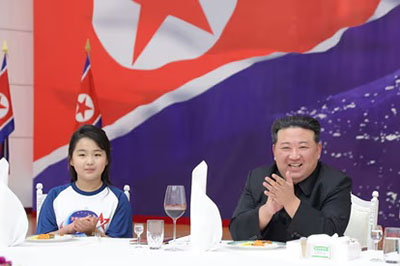Special to WorldTribune.com
 By John J. Metzler, December 1, 2023
By John J. Metzler, December 1, 2023
North Korea got lucky. After two previous failures earlier this year to launch a spy satellite, the Pyongyang regime successfully sent a satellite into orbit. Using a powerful Chollima rocket, the military satellite was placed into orbit prompting leader Kim Jong-Un to proclaim the launch “had propelled the country into a new era of space power.”
Amid celebrations with his family, Kim said “the possession of a reconnaissance satellite is a full-fledged exercise of the right of self-defense,” for the quaintly titled Democratic People’s Republic of Korea (DPRK).
In a scene evoking a DPRK socialist Disneyland, Kim Jong-Un is seen beaming at a celebratory reception of space scientists and technicians along with his wife Ri Sol-Ju and, daughter, Kim Ju-Ae, who is wearing a glitzy space themed T shirt, which was dutifully reported by the North state-run Korean Central News Agency.
Kim’s daughter Ju-Ae, though believed to be in her early teens, appears to being groomed for an eventual leadership role in the unique Marxist Monarchy started by the current ruler’s grandfather Kim Il-Sung in 1948.

Initial skepticism over the launch and the technological capacity of the spy satellite is actually secondary to the fact that North Korea has done it; Psychologically this brings the DPRK military capacity up a notch. Deploying an operational spy satellite is an integral part of North Korea’s five-year military plan. In theory the satellite could allow the North monitoring of South Korean and American military forces on the divided peninsula as well as beyond the immediate region towards Okinawa and Guam.
According to the South Korean intel agency, the launch was aided and abetted by Russian aid and technical assistance, reflecting the warming ties between Pyongyang and Moscow in the wake of Kim’s surprise September visit to see Vladimir Putin in the Russian Far East.
Significantly multiple United Nations Security Council sanctions resolutions clearly forbid the DPRK regime to develop and test ballistic missile technology.
Addressing the launch at Security Council meeting, Assistant Secretary General Khaled Khiari stated clearly, “While sovereign states have the right to benefit from peaceful space activities, Security Council resolutions expressly prohibit the DPRK from conduction of any launches using ballistic missile technology.”
Shortly after the missile firing, a tough statement by nine members of the Security Council including France, the United Kingdom and the United States along with South Korea issued a statement to “strongly condemn the Democratic People’s Republic of Korea’s (DPRK) November 21 launch of a space launch vehicle (SLV) using ballistic missile technology… In addition to launching three SLVs this year, the DPRK has launched 29 ballistic missiles, including four ICBMs. This behavior threatens international and regional peace and security.”
The statement added, “The DPRK must abandon its unlawful weapons of mass destruction and ballistic missile programs in a complete, verifiable, and irreversible manner.”
UN Secretary General Antonio Guterres also condemned Pyongyang for carrying out a military satellite launch using ballistic missile technology.
All of the recent inter-Korean Sturm und Drang over the satellite launch caused Pyongyang to scrap a 2018 military accord which in effect seeks to de-escalate crises and to avoid military miscalculations. Abrogation of the Accord raises the risk of inadvertent clashes along the 38th parallel dividing the two Korean states.
Seoul’s respected Korea Times stressed editorially, “Now is the time for the two Koreas to regain their cool and seek an exit strategy…North Korean leader Kim Jong-un perceives, or misperceives, the current global situation as favorable for his reclusive regime.”
Naturally reading the tea leaves in his isolated Pyongyang bubble allows supreme leader Kim the political misperception that South Korea, given the military overstretch of its American allies, in Ukraine, Israel and possibly Taiwan at some point, faces a vulnerable moment.
Moreover, Pyongyang’s renewed political bromance with Vladimir Putin’s rogue Russian state, along with its longtime but wary comrades in Beijing, may tempt the Democratic People’s Republic of Korea with the illusion that it moves in the company of giants.
This would be a very dangerous miscalculation.
John J. Metzler is a United Nations correspondent covering diplomatic and defense issues. He is the author of Divided Dynamism the Diplomacy of Separated Nations: Germany, Korea, China (2014). [See pre-2011 Archives]
